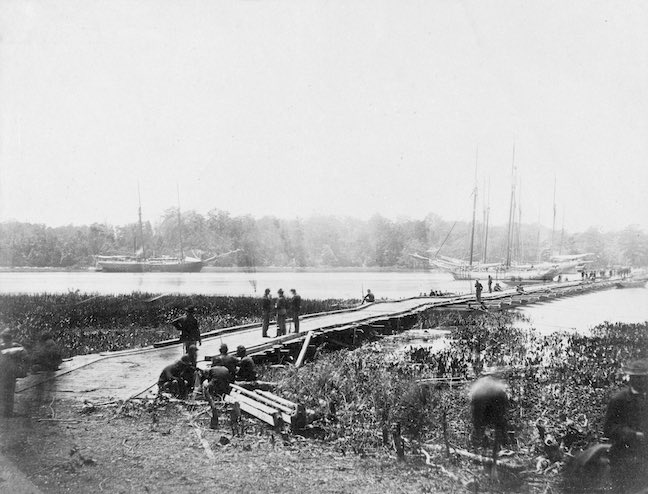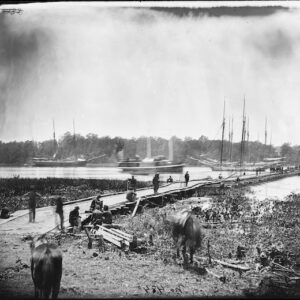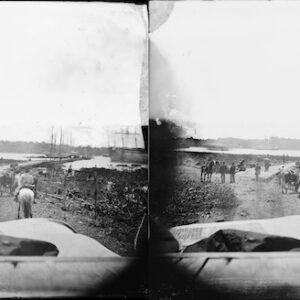| Credit: | by Gardner (James) |
|---|---|
| Date: | 1864.06.12-17 |
| Negative Size: | 8 in. x 10 in. |
| Equipment: | bridge pontoon (wood) |
| Locations & Lines: | Powhatan Point VA; James River; Virginia |
| Military Units: | Army of the Potomac; US Army |
| Structures & Establishments: | Powhatan Point pontoon bridge (James River VA) |
| Transports: | schooner |
| Sources: | Library of Congress; National Archives |
$6.99
File Details: AILXm, 800 DPI, TIFF, Original Photograph, 41.3 Mb
Image ID: AILX
Gardners Photographic Sketch Book Of The War. Vol. 2, No. 69. Pontoon Bridge Across the James. June, 1864. This sketch represents one of the pontoon bridges across the James River, at Powhattan Point, near Harrisons Landing, and not far from Charles City Court-House; and which was used by Gen. Grants army, in his march from Coal [sic] Harbor to City Point. The bridge was laid down on the fourteenth of June, 1864, and the troops commenced crossing the next day. Gen Warrens Corps moved from its position, one mile in rear of Coal [sic] Harbor, and marched across the Richmond and York River Railroad, taking the Long Bridge road over the Chickahominy and down to the James, followed by Hancock, Wright and Burnside; the Eighteenth Corps having already occupied Bermuda Hundreds, on the north side of the James, several miles above the pontoons. The enemy made no attempt to interrupt the movement, confining himself to the defenses of Richmond. The passage of the James River was effected without the loss of a gun or wagon, Wilsons Cavalry covering the rear from attack, and enabling the army to cross without undue haste. After the infantry had passed over, the immense wagon trains crossed, followed by the cattle herds, and finally the Cavalry. The scene at this point during the passage of the river by the army was most spirited. The stream was crowded with gunboats, transports and sailing vessels, as far as the eye could reach, while on both sides of the river a long cloud of dust marked the line of march across the level country. Simultaneously with this movement of our troops, the rebels left their defences [sic] north or Richmond, and marched through the city towards Petersburg, in front of which the first engagement took place on the fifteenth, resulting in the capture of the enemys entrenchments and the occupation of the city by our Cavalry. Unfortunately the advantage thus gained was not held, the Cavalry falling back upon our Infantry, which failed to get up in time to prevent the rebels from reoccupying the city.
During the passage of the army across the James, the mails and passengers were brought from Washington to these bridges, and transferred by means of small boats, to steamers above the pontoons, thus enabling them to reach City Point and Bermuda Hundreds without much delay. No better summary of these few days events can be given, than on the despatch [sic] of Gen. Grant to the President, on the seventeenth. He says,
The Ninth Corps crossed this morning, carried two more redoubts, forming a pert of the defences [sic] of Petersburg, capturing four hundred and fifty prisoners and four guns. Our successes are being followed up. Our forces drew out from within fifty yards of the enemys intrenchments, at Coal [sic] Harbor, made a flank movement, of about fifty-five miles march, crossing the Chickahominy and James Riversthe latter two thousand feet wide and eighty-four deep at the point of crossingand surprised the enemys rear at Petersburg. This was done without the loss of a wagon or piece of artillery, and only about one hundred and fifty stragglers were picked up by the enemy. In covering this move, Warrens Crops and Wilsons Cavalry had frequent skirmishing with the enemy, each losing from fifty to sixty killed and wounded, but inflicting an equal if not greater loss upon the enemy.



